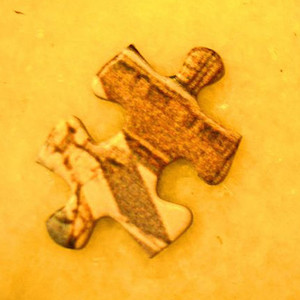Puzzle Pieces

When I’m done, I take the elevator down. This gray morning feels like late afternoon. On the second floor, the man who walks like I once walked—two months ago—steps into the elevator, and exclaims, Good timing! Was he at physical therapy? I ask this. He was. A ding announces our destination. He steps out, is nearly out of the building by the time I’m out of the elevator.
*
The woman who pieces puzzles by the window left before I stepped into the elevator. As I waited to work with the woman in a blue shirt and sweat pants, a name tag dangling from her neck, the man in a wheelchair, who had a prosthetic on his knee, returned and asked the woman who pieces puzzles by the window about her work. She’d made progress, had left before I could step into the elevator.
*
The woman who pieces puzzles by the window stands and stretches, never taking her eyes from her work. Head bowed, she shakes her legs, first one, then the other. She shakes her wrists. She sits.
*
The woman in a blue shirt and sweat pants, a name tag dangling from her neck, ties a pink belt around my waist, grips the long-hanging strap, and tells me to turn my head left and right ten times. Then up and down. Now, gripping the belt strap, close your eyes and do it again. She walks me to a treadmill, harnesses me to the ceiling, reminds me I can’t fall. I walk ten minutes at one mile per hour. Then carry five pounds twenty feet and back. Then step on a foam mat ten times, first with my eyes open, then another ten times with my eyes closed. I sit, lightheaded but breathing.
*
The woman who pieces puzzles by the window isn’t a nurse here, though she looks like one, maroon pants, light as scrubs, walking shoes, patience—she waits an hour for the man in a wheelchair, a prosthetic on his knee; a shoe on the end of the fake foot matches the real one.
*
The woman who pieces puzzles by the window rides the elevator to the third floor, accompanied by the man in a wheelchair, a prosthetic on his knee, a tennis shoe tied to its other end. It matches the one on his real foot. He passes me, a young black man a fraction of his age. I hold a wooden cane. I’m worried. About my brain. The base—or at least the part which, when I look at pictures of my brain, is at the bottom—withered, my limbs pained.
*
The man who walks like I did just two months ago—normally, pain free—hurries into the elevator, a handkerchief in one hand, a smile on his face. He says hello, points to number two, hesitates—as I do, too—presses it, and stands quietly, grinning, until a ding announces our destination.










